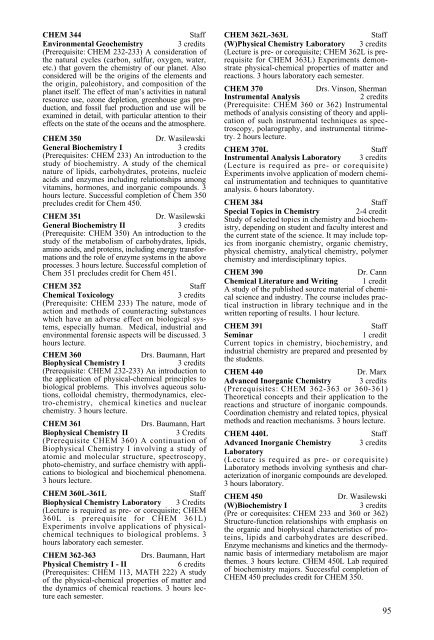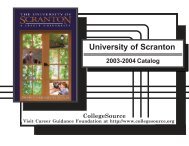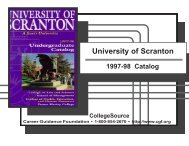You also want an ePaper? Increase the reach of your titles
YUMPU automatically turns print PDFs into web optimized ePapers that Google loves.
CHEM 344 Staff<br />
Environmental Geochemistry 3 credits<br />
(Prerequisite: CHEM 232-233) A consideration <strong>of</strong><br />
the natural cycles (carbon, sulfur, oxygen, water,<br />
etc.) that govern the chemistry <strong>of</strong> our planet. Also<br />
considered will be the origins <strong>of</strong> the elements and<br />
the origin, paleohistory, and composition <strong>of</strong> the<br />
planet itself. <strong>The</strong> effect <strong>of</strong> man’s activities in natural<br />
resource use, ozone depletion, greenhouse gas production,<br />
and fossil fuel production and use will be<br />
examined in detail, with particular attention to their<br />
effects on the state <strong>of</strong> the oceans and the atmosphere.<br />
CHEM 350 Dr. Wasilewski<br />
General Biochemistry I 3 credits<br />
(Prerequisites: CHEM 233) An introduction to the<br />
study <strong>of</strong> biochemistry. A study <strong>of</strong> the chemical<br />
nature <strong>of</strong> lipids, carbohydrates, proteins, nucleic<br />
acids and enzymes including relationships among<br />
vitamins, hormones, and inorganic compounds. 3<br />
hours lecture. Successful completion <strong>of</strong> Chem 350<br />
precludes credit for Chem 450.<br />
CHEM 351 Dr. Wasilewski<br />
General Biochemistry II 3 credits<br />
(Prerequisite: CHEM 350) An introduction to the<br />
study <strong>of</strong> the metabolism <strong>of</strong> carbohydrates, lipids,<br />
amino acids, and proteins, including energy transformations<br />
and the role <strong>of</strong> enzyme systems in the above<br />
processes. 3 hours lecture. Successful completion <strong>of</strong><br />
Chem 351 precludes credit for Chem 451.<br />
CHEM 352 Staff<br />
Chemical Toxicology 3 credits<br />
(Prerequisite: CHEM 233) <strong>The</strong> nature, mode <strong>of</strong><br />
action and methods <strong>of</strong> counteracting substances<br />
which have an adverse effect on biological systems,<br />
especially human. Medical, industrial and<br />
environmental forensic aspects will be discussed. 3<br />
hours lecture.<br />
CHEM 360 Drs. Baumann, Hart<br />
Biophysical Chemistry I 3 credits<br />
(Prerequisite: CHEM 232-233) An introduction to<br />
the application <strong>of</strong> physical-chemical principles to<br />
biological problems. This involves aqueous solutions,<br />
colloidal chemistry, thermodynamics, electro-chemistry,<br />
chemical kinetics and nuclear<br />
chemistry. 3 hours lecture.<br />
CHEM 361 Drs. Baumann, Hart<br />
Biophysical Chemistry II 3 Credits<br />
(Prerequisite CHEM 360) A continuation <strong>of</strong><br />
Biophysical Chemistry I involving a study <strong>of</strong><br />
atomic and molecular structure, spectroscopy,<br />
photo-chemistry, and surface chemistry with applications<br />
to biological and biochemical phenomena.<br />
3 hours lecture.<br />
CHEM 360L-361L Staff<br />
Biophysical Chemistry Laboratory 3 Credits<br />
(Lecture is required as pre- or corequisite; CHEM<br />
360L is prerequisite for CHEM 361L)<br />
Experiments involve applications <strong>of</strong> physicalchemical<br />
techniques to biological problems. 3<br />
hours laboratory each semester.<br />
CHEM 362-363 Drs. Baumann, Hart<br />
Physical Chemistry I - II 6 credits<br />
(Prerequisites: CHEM 113, MATH 222) A study<br />
<strong>of</strong> the physical-chemical properties <strong>of</strong> matter and<br />
the dynamics <strong>of</strong> chemical reactions. 3 hours lecture<br />
each semester.<br />
CHEM 362L-363L Staff<br />
(W)Physical Chemistry Laboratory 3 credits<br />
(Lecture is pre- or corequisite; CHEM 362L is prerequisite<br />
for CHEM 363L) Experiments demonstrate<br />
physical-chemical properties <strong>of</strong> matter and<br />
reactions. 3 hours laboratory each semester.<br />
CHEM 370 Drs. Vinson, Sherman<br />
Instrumental Analysis 2 credits<br />
(Prerequisite: CHEM 360 or 362) Instrumental<br />
methods <strong>of</strong> analysis consisting <strong>of</strong> theory and application<br />
<strong>of</strong> such instrumental techniques as spectroscopy,<br />
polarography, and instrumental titrimetry.<br />
2 hours lecture.<br />
CHEM 370L Staff<br />
Instrumental Analysis Laboratory 3 credits<br />
(Lecture is required as pre- or corequisite)<br />
Experiments involve application <strong>of</strong> modern chemical<br />
instrumentation and techniques to quantitative<br />
analysis. 6 hours laboratory.<br />
CHEM 384 Staff<br />
Special Topics in Chemistry 2-4 credit<br />
Study <strong>of</strong> selected topics in chemistry and biochemistry,<br />
depending on student and faculty interest and<br />
the current state <strong>of</strong> the science. It may include topics<br />
from inorganic chemistry, organic chemistry,<br />
physical chemistry, analytical chemistry, polymer<br />
chemistry and interdisciplinary topics.<br />
CHEM 390 Dr. Cann<br />
Chemical Literature and Writing 1 credit<br />
A study <strong>of</strong> the published source material <strong>of</strong> chemical<br />
science and industry. <strong>The</strong> course includes practical<br />
instruction in library technique and in the<br />
written reporting <strong>of</strong> results. 1 hour lecture.<br />
CHEM 391 Staff<br />
Seminar 1 credit<br />
Current topics in chemistry, biochemistry, and<br />
industrial chemistry are prepared and presented by<br />
the students.<br />
CHEM 440 Dr. Marx<br />
Advanced Inorganic Chemistry 3 credits<br />
(Prerequisites: CHEM 362-363 or 360-361)<br />
<strong>The</strong>oretical concepts and their application to the<br />
reactions and structure <strong>of</strong> inorganic compounds.<br />
Coordination chemistry and related topics, physical<br />
methods and reaction mechanisms. 3 hours lecture.<br />
CHEM 440L Staff<br />
Advanced Inorganic Chemistry 3 credits<br />
Laboratory<br />
(Lecture is required as pre- or corequisite)<br />
Laboratory methods involving synthesis and characterization<br />
<strong>of</strong> inorganic compounds are developed.<br />
3 hours laboratory.<br />
CHEM 450 Dr. Wasilewski<br />
(W)Biochemistry I 3 credits<br />
(Pre or corequisites: CHEM 233 and 360 or 362)<br />
Structure-function relationships with emphasis on<br />
the organic and biophysical characteristics <strong>of</strong> proteins,<br />
lipids and carbohydrates are described.<br />
Enzyme mechanisms and kinetics and the thermodynamic<br />
basis <strong>of</strong> intermediary metabolism are major<br />
themes. 3 hours lecture. CHEM 450L Lab required<br />
<strong>of</strong> biochemistry majors. Successful completion <strong>of</strong><br />
CHEM 450 precludes credit for CHEM 350.<br />
95
















